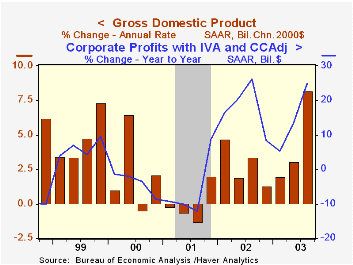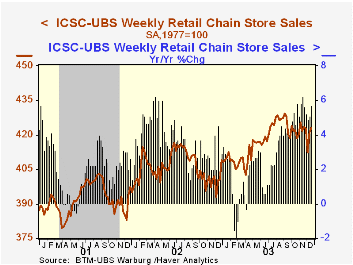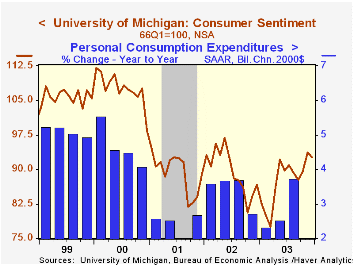 Global| Dec 23 2003
Global| Dec 23 20033Q U.S. GDP Unrevised at 8.2%
by:Tom Moeller
|in:Economy in Brief
Summary
US economic growth was unrevised at 8.2% (AR) for 3Q03, as expected. Growth in corporate profits w/IVA & CCA was lowered slightly to 46.0% (AR, 24.9% y/y) from the initial read of 56.0% growth. That followed a 48.1% burst in 2Q. [...]

US economic growth was unrevised at 8.2% (AR) for 3Q03, as expected.
Growth in corporate profits w/IVA & CCA was lowered slightly to 46.0% (AR, 24.9% y/y) from the initial read of 56.0% growth. That followed a 48.1% burst in 2Q. Profits after tax jumped 43.0% (AR, 13.9% y/y) and cash flow rose 30.3% (AR, 15.0% y/y).
Profits in the nonfinancial corporate sector (calculated from the income side of the NIPA) jumped at a 58.5% rate (34.5% y/y), revised down from the initial estimate of 75.2% growth.
Domestic final demand growth was revised up slightly to 7.2%. Growth in business investment in equipment & software was revised down slightly to 17.6% from 18.4% but PCE growth was raised to 6.9% from 6.4%.
Inflation was revised down a touch to 1.6% from 1.7%. The PCE price deflator was revised down to 1.8% (AR, 1.7% y/y).
| Chained 2000$, % AR | 3Q'03 (Revised) | 3Q'03 (Prelim.) | 2Q'03 | Y/Y | 2002 | 2001 |
|---|---|---|---|---|---|---|
| GDP | 8.2% | 8.2% | 3.1% | 3.6% | 2.2% | 0.5% |
| Inventory Effect | -0.1% | 0.2% | -0.2% | -0.4% | 0.4% | -0.9% |
| Final Sales | 8.3% | 8.0% | 3.3% | 4.0% | 1.8% | 1.4% |
| Trade Effect | 0.8% | 0.8% | -1.3% | -0.1% | -0.6% | -0.2% |
| Domestic Final Demand | 7.2% | 6.8% | 4.5% | 4.1% | 2.4% | 1.6% |
| Chained GDP Price Deflator | 1.6% | 1.7% | 1.1% | 1.7% | 1.5% | 2.4% |
by Tom Moeller December 23, 2003

Chain store sales last week added another 0.6% to the 2.1% jump of the prior week, according to the ICSC-UBS survey. The level of sales in this week before the Christmas holiday was the highest in a month.
Sales so far in December are down 1.1% from the November average. During all of November sales rose 0.5% versus the prior month.
During the last five years there has been a 61% correlation between the year-to-year percent change in the ICSC-UBS measure of chain store sales and the change in non-auto retail sales less gasoline.
The ICSC-UBS retail chain-store sales index is constructed using the same-store sales reported by 78 stores of seven retailers: Dayton Hudson, Federated, Kmart, May, J.C. Penney, Sears and Wal-Mart.
| ICSC-UBS (SA, 1977=100) | 12/20/03 | 12/13/03 | Y/Y | 2002 | 2001 | 2000 |
|---|---|---|---|---|---|---|
| Total Weekly Retail Chain Store Sales | 423.1 | 420.7 | 5.7% | 3.6% | 2.1% | 3.4% |
by Tom Moeller December 23, 2003

The University of Michigan’s consumer sentiment index fell just slightly in December to 93.6. That was considerably better than the mid-month reading of 89.6 and reflected a jump in sentiment after the capture of Saddam Hussein. Consensus expectations were for a reading of 90.5.
During the last ten years there has been an 81% correlation between the level of consumer sentiment and the y/y change in real PCE. That correlation has risen to 89% during the last five years.
The current conditions index fell to 97.0 but the expectations index rose to 89.8, the highest level since May of this year.
The University of Michigan survey is not seasonally adjusted.It is based on telephone interviews with 250 households nationwide on personal finances and business and buying conditions. The survey is expanded to a total of 500 interviews at month end.
| University of Michigan | Dec | Nov | Y/Y | 2002 | 2001 | 2000 |
|---|---|---|---|---|---|---|
| Consumer Sentiment | 93.6 | 93.7 | 6.8% | 89.6 | 89.2 | 107.6 |
| Current Conditions | 97.0 | 102.5 | 1.0% | 97.5 | 100.1 | 115.2 |
| Consumer Expectations | 89.8 | 88.1 | 11.1% | 84.6 | 82.3 | 102.7 |
Tom Moeller
AuthorMore in Author Profile »Prior to joining Haver Analytics in 2000, Mr. Moeller worked as the Economist at Chancellor Capital Management from 1985 to 1999. There, he developed comprehensive economic forecasts and interpreted economic data for equity and fixed income portfolio managers. Also at Chancellor, Mr. Moeller worked as an equity analyst and was responsible for researching and rating companies in the economically sensitive automobile and housing industries for investment in Chancellor’s equity portfolio. Prior to joining Chancellor, Mr. Moeller was an Economist at Citibank from 1979 to 1984. He also analyzed pricing behavior in the metals industry for the Council on Wage and Price Stability in Washington, D.C. In 1999, Mr. Moeller received the award for most accurate forecast from the Forecasters' Club of New York. From 1990 to 1992 he was President of the New York Association for Business Economists. Mr. Moeller earned an M.B.A. in Finance from Fordham University, where he graduated in 1987. He holds a Bachelor of Arts in Economics from George Washington University.
More Economy in Brief
 Global| Feb 05 2026
Global| Feb 05 2026Charts of the Week: Balanced Policy, Resilient Data and AI Narratives
by:Andrew Cates






